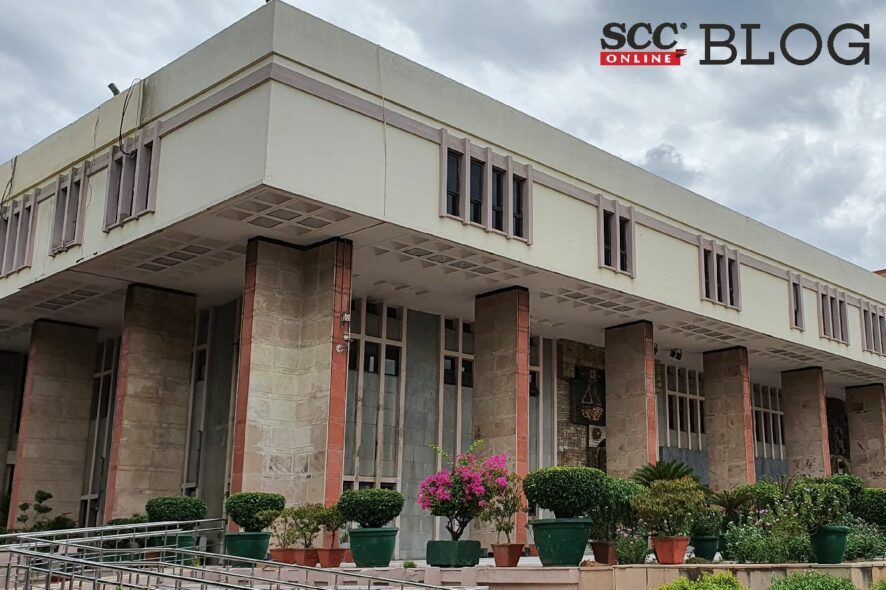Delhi High Court: The Division Bench of D.N. Patel, CJ and Jyoti Singh, J., held that the Chairman of Central Administrative Tribunal has been conferred the power to transfer a matter from one Bench to another, on his own motion, without any application from any party.
Petitioner filed the present petition assailing the order of Central Administrative Tribunal and sought a direction that Original Application filed by the petitioner be heard and disposed of by the Tribunal, Kolkata Bench.
Factual Matrix
Petitioner had joined AS in 1987 and was allocated the West Bengal cadre, in 2021 he was superannuated and at that time was working as the Chief Secretary of the State of West Bengal.
On May 26th, a cyclone named ‘YAAS’ had hit parts of West Bengal and Odisha and on 31st May, a Show Cause Notice was issued by the Ministry of Home Affairs to the petitioner for abstaining himself from a crucial review meeting chaired by the Prime minister for assessing loss of life and property and damage to the infrastructure caused by the cyclonic storm.
In June, 2021 a major penalty charge sheet was also issued to the petitioner by the respondents for not attending the aforesaid meeting, as well as for not apprising the Prime Minister about the hardships and sufferings faced by the people of West Bengal amongst other allegations mentioned in the statement of Articles of Charges and imputation of the alleged misconduct or misbehavior.
When the hearing notice arrived, the petitioner filed an application under Section 19 of the Administrative Tribunal Act, 1985 challenging the charge sheet. During the pendency of OA respondents filed a transfer petition before the Tribunal under Section 25 of the Administrative Tribunal Act, 1985 Act seeking transfer of the OA filed by the petitioner.
Transfer petition was allowed, and the order was challenged by the petitioner before the Calcutta High Court. Principal Bench of the Tribunal issued a notice and the was accepted on behalf of the respondents, later the Calcutta High Court allowed the petition filed by the petitioner and set aside the Tribunal’s Order passed in Transfer Petition.
The above judgment of the Calcutta High Court was challenged on the ground that the said Court lacked territorial jurisdiction to entertain the challenge, later Supreme Court had allowed the Calcutta High Court’s decision.
Since the Supreme Court had given liberty to the petitioner to assail the Principal Bench order in the Transfer Petition before Jurisdictional High Court, the petitioner approached this, Court.
Analysis, Law and Decision
Firstly, the High Court expressed that under Section 25 of the 1985 Act, the Chairman can on his own motion, without any notice, transfer any case pending before one Bench for disposal to another Bench.
Further, since the cause of action arose in New Delhi, no error could be found with the impugned order.
Rule 6(2) of 1987 Rules gives an option to the applicant who has ceased to be in service, to file an application before a Bench, within whose jurisdiction such person is ordinarily residing at the time of filing of the application.
The question that arose in the present matter:
Whether the above-stated right of an applicant can control or regulate the administrative powers of a Chairman under Section 25 of the 1985 Act?
High Court answered it in negative.
The Bench agreed with the argument of My Tushar Mehta, Solicitor General that the power of a Chairman of CAT under Section 25 of the 1985 Act is purely an administrative power to transfer cases from one Bench to another, which can be exercised on an application by any party or even on his own motion in a given case and where the facts and circumstances so warrant.
High Court held that it may not be wrong to hold that the administrative powers are akin to the power of the Master of Roster, who alone has the prerogative to constitute the Benches and allocate cases.
Hence for the present matter, Court stated that, while the petitioner has the option to approach the Bench at a place where he was ordinarily residing at the time of filing the application, however, the Chairman of the Tribunal has the administrative powers to transfer the matter to another Bench, albeit for sound reasons and after notice to and hearing the parties to the lis.
The scope of judicial review of an administrative decision is extremely limited and can only be exercised to scrutinize the decision-making process.
High Court found no infirmity in the exercise of the administrative power, either on the procedural aspects or on the merits.
Being purely an administrative power of the Chairman, it is not for this Court to substitute its decision or wisdom for that of the Chairman as no illegality, arbitrariness or infirmity has been found in the decision making process.
In view of the above. The petition was dismissed. [Alapan Bandyopadhyay v. Union of India, 2022 SCC OnLine Del 683, decided on 7-3-2022]
Advocates before the Court:
For the Petitioner:
Mr Karthikey Bhatt, Advocate
For the Respondents:
Mr Tushar Mehta, Solicitor General along with Mr Vikramjeet Banerjee Additional Solicitor General with Mr Kirtiman Singh, Central Government Standing Counsel with Mr Waize Ali Noor, Mr Taha Yasin and Ms Srirupa Nag Advocates for UOI.







